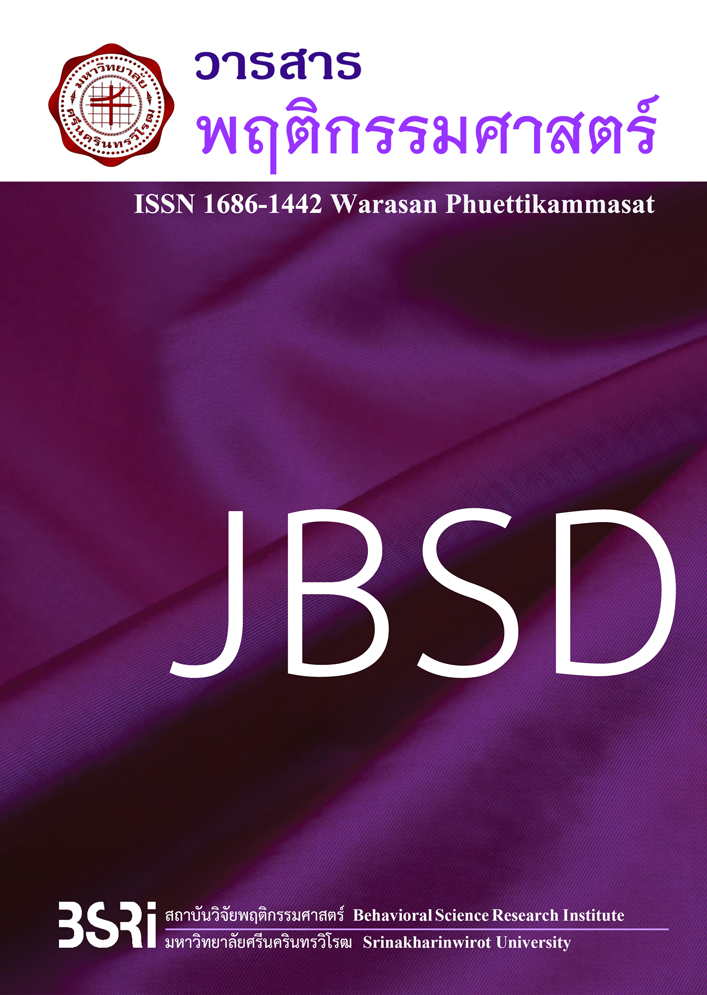บทบาทของจิตวิญญาณในการทำงานในการส่งเสริมความยึดมั่นผูกพันของพนักงาน (The Role of Spirituality at Work for Enhancing Employee Engagement)
Keywords:
จิตวิญญาณในสถานที่ทำงาน, ภาวะผู้นำเชิงจิตวิญญาณ, สุขภาวะทางจิตวิญญาณ, ความยึดมั่นผูกพันของพนักงาน, workplace spirituality, spiritual leadership, spiritual well-being, employee engagementAbstract
The purpose of this study was to examine the direct and indirect effects of spirituality at work factor on employee engagement of professional nurses in non-profit private hospitals. Spirituality at work factor consisted of workplace spirituality, spiritual leadership and spiritual well-being. This study divided employee engagement into two variables based on primary roles in organization which were work engagement and organizational engagement. In addition, work competence was included in the model as personal resource variable and played as mediator variables among spirituality at work factor variables and two types of employee engagement. The samples were 221 professional nurses from 4 non-profit private hospitals that were Saint Louis Hospital, Camillian Hospital, Sancamillo Hospital Ratchaburi and Saint Mary’s Hospital. The modified causal model showed good fit ((c2 (6) = 10.23, p = .11, RMSEA = .057, TLI = .99, CFI = 1.0, SRMR = .017) with all causal variables had statistical significant positive effects on work and organizational engagement. Workplace spirituality had highest total effects on two types of engagement; all of these effects were indirect effects. Due to being the only variable in the model having both direct and indirect effects on two types of engagement, spiritual leadership was the most important mediator which conveyed the effects from workplace spirituality to employee engagement.
Keywords: workplace spirituality, spiritual leadership, spiritual well-being, employee engagement
บทคัดย่อ
การวิจัยนี้มีวัตถุประสงค์เพื่อศึกษาอิทธิพลทั้งทางตรงและทางอ้อมระหว่างปัจจัยทางจิตวิญญาณในการทำงานที่ส่งผลต่อความยึดมั่นผูกพันของพยาบาลวิชาชีพในโรงพยาบาลเอกชนที่ไม่มุ่งแสวงหาผลกำไร ปัจจัยทางจิตวิญญาณประกอบไปด้วยตัวแปรจิตวิญญาณในสถานที่ทำงาน ภาวะผู้นำเชิงจิตวิญญาณ และสุขภาวะทางจิตวิญญาณ สำหรับความยึดมั่นผูกพันของพนักงานในงานวิจัยนี้แบ่งออกเป็นสองประเภทตามบทบาทหลักสำคัญในบริบทของการทำงาน ได้แก่ ความยึดมั่นผูกพันในงานและความยึดมั่นผูกต่อองค์การ งานวิจัยนี้ได้เพิ่มตัวแปรสมรรถนะในการปฏิบัติงานเป็นตัวแปรเชิงสาเหตุในกลุ่มทรัพยากรจากตัวบุคคลและกำหนดให้เป็นตัวแปรส่งผ่านอิทธิพลจากปัจจัยทางจิตวิญญาณมาสู่ผลคือความยึดมั่นผูกพันของพนักงานทั้งสองประเภท กลุ่มตัวอย่างในงานวิจัยนี้คือพยาบาลวิชาชีพของโรงพยาบาลเอกชนที่ไม่มุ่งแสวงหาผลกำไร 4 แห่ง ได้แก่ โรงพยาบาลเซนต์หลุยส์ โรงพยาบาลคามิลเลียน โรงพยาบาลซานคามิลโล ราชบุรี และโรงพยาบาลเซนต์แมรี่ จำนวน 221 คน ผลการวิจัยพบว่าแบบจำลองที่ปรับมีความกลมกลืนกับข้อมูลเชิงประจักษ์ (c2 (6) = 10.23, p = 0.11, RMSEA = 0.057, TLI = 0.99, CFI = 1.0, SRMR = 0.017) ตัวแปรเชิงสาเหตุทุกตัวมีอิทธิพลทางบวกอย่างมีนัยสำคัญต่อความยึดมั่นผูกพันในงานและต่อองค์การ จิตวิญญาณในสถานที่ทำงานเป็นตัวแปรเชิงสาเหตุที่มีอิทธิพลรวมสูงที่สุดต่อความยึดมั่นผูกพันทั้งสองประเภท แต่อิทธิพลที่มีนั้นเป็นอิทธิพลทางอ้อมทั้งหมด ภาวะผู้นำเชิงจิตวิญญาณเป็นตัวแปรส่งผ่านที่สำคัญที่สุดที่จะนำผลของจิตวิญญาณในสถานที่ทำงานไปสู่ผลในการส่งเสริมความยึดมั่นผูกพันทั้งสองประเภท และเป็นตัวแปรเชิงสาเหตุตัวเดียวที่สามารถมีอิทธิพลได้ทั้งทางตรงและทางอ้อมต่อความยึดมั่นผูกพันในงานและต่อองค์การ
คำสำคัญ: จิตวิญญาณในสถานที่ทำงาน ภาวะผู้นำเชิงจิตวิญญาณ สุขภาวะทางจิตวิญญาณ ความยึดมั่นผูกพันของพนักงาน
Downloads
Downloads
Published
How to Cite
Issue
Section
License
Behavioral Science Research Institute, SWU
114 Sukhumvit 23, Bangkok 10110, Thailand.
Tel.02-649-5000 # 17600



